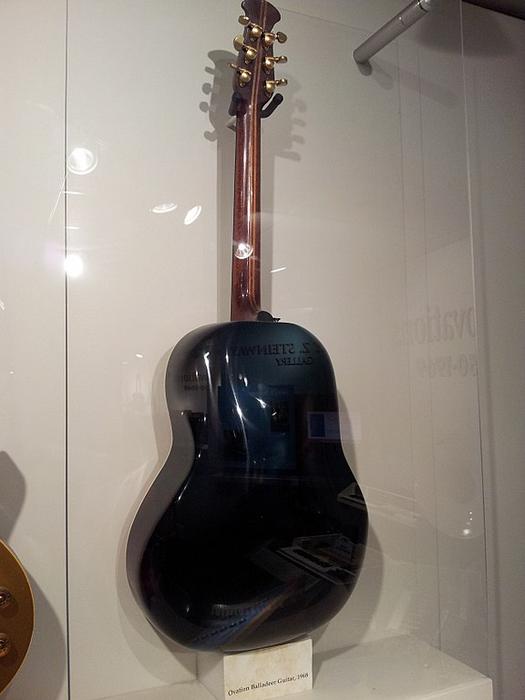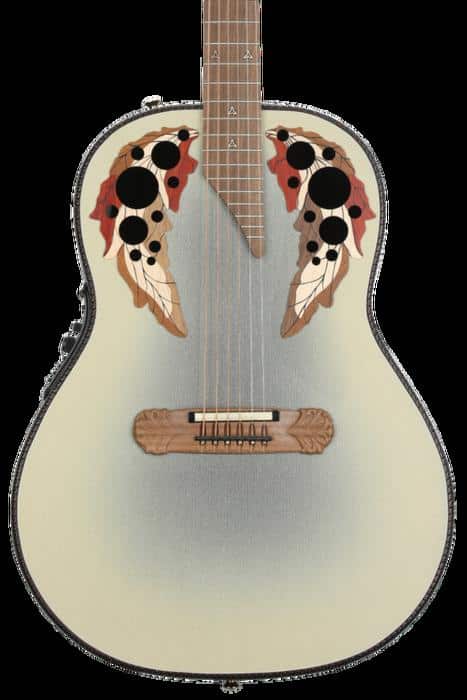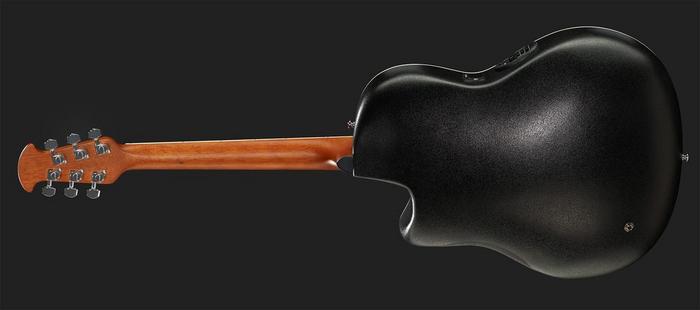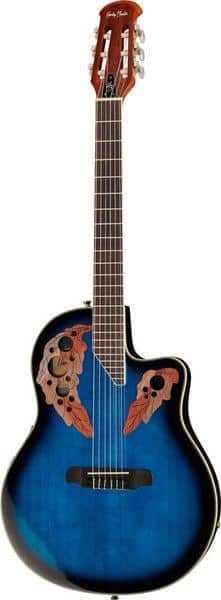A chilling breeze swept the workshop as I held the first rounded back guitar I had ever crafted. It was the genesis of a monumental change, both in my understanding of guitars and in my life’s work. But that moment wasn’t about perfection—it was about potential. Potential that lay within the strange, curved anatomy of the instrument, in the exacting professorship of woodworking it demanded, and the mystifying resonance it promised.
Almost incomprehensible at first, the rounded back guitar captivated me with its unique blend of science, ergonomics, and sheer artistry. As an engineer turned luthier, I embarked on an odyssey—dissecting brands, analysing opinions, and scrutinizing every feature of these peculiar instruments.
Prepare to join me in uncovering this journey, as we delve deeper into the world of rounded back guitars—unearthing hidden truths and challenging preconceptions. This is your exclusive pass into the heart of their magic.
Brands of Rounded Back Guitars
Ovation Guitars

During my tenure in lutherie, no brand has demonstrated more commitment towards creating innovative designs for rounded back guitars than Ovation Guitars. Ovation has been instrumental in escalating the popularity of these guitars, challenging conventional flat back designs with their unique rounded ones. They’ve undoubtedly left an indelible mark in this category, setting high standards for other brands. Their dedication to craftsmanship and precision reflect prominently in the quality of their guitars. As we transition into discussing other brands like Rainsong and Adamas, it becomes increasingly clear how Ovation has set the precedent in this sphere.
Rainsong Guitars

Shifting focus to an innovative pioneer in fiberglass, Rainsong guitars add striking ingenuity to our list of rounded back guitar manufacturers. My expertise in instrument acoustics compels me to applaud their unique composite construction methods. Fiberglass material, a key element of their formula, remarkably enriches the resonance and durability of these guitars. A testament to Rainsong’s innovation, this use of non-traditional material sets a new standard in the world of rounded back guitars. With their wonderful tonal qualities and unparalleled strength, these guitars truly echo their brand’s name, producing sounds as mesmerizing as a rain-soaked melody.
Adamas Guitars

Transitioning from Rainsong, another gem in the realm of rounded back guitars is Adamas. The meticulous engineering behind Adamas guitars is laudable, particularly their approach to the sound hole placement and design. From my acoustics-informed perspective, such detail contributes significantly to their unique tone and resonance.
The sound hole in Adamas guitars isn’t simply a functional element but a defining feature. Their oval-shaped, off-center positioning underscores their innovative design approach. Consequently, it enhances the overall sound distribution, making these guitars stand out in the rounded-back landscape. This reflects my personal affinity for the blend of science and artistry in guitar construction.
As we journey on to explore the influence of various features on these guitars, the distinct value addition by Adamas will serve as an enlightening reference. Their combination of careful design and innovative features provides a vivid example of how brands can influence the trajectory of rounded back guitars.
Features of Rounded Back Guitars

As someone with a keen interest in ergonomics and acoustics, rounded back guitars have always intrigued me. As opposed to traditional flat backs, rounded back guitars offer some unique features that make them really stand out. The obvious difference lies in the round back design itself. This distinctive shape fits snugly against your body providing exceptional comfort. On a deeper note, the rounded shape affects the overall tone and resonance of the guitar. The tapered back design has a marked influence on the guitar’s sound projection, generating a vibrant and energetic tone.
The rounded back design isn’t just about looks. Can you guess what unique sound and playing advantages these guitars offer? The surprise answer lies in transforming the vibrations from the guitar strings to produce a clearer, louder sound. With a design that positions the strings closer to the body and maximizes string vibration, round back guitars achieve their iconic, clear tone. This tonal benefit is not often associated with traditional acoustic guitars.
Another distinguishing aspect of rounded back guitars is the incorporation of onboard electronics. These electronic components enhance versatility, allowing the player to achieve a wide variety of sounds, making them highly adaptable to different genres of music. These guitars are also typically lighter due to their build, making them suitable for extended play.
In my experience, while rounded back guitars might take some getting used to, they offer an advantageous blend of comfort, unique acoustics, and versatility. From the way they hug your body to the distinct tone they produce, these guitars truly offer a personalized playing experience.
Acoustic Guitarists’ Opinions on Rounded Back Guitars

As I delve deeper into the world of acoustic guitars, my appreciation for the diverse array of options and designs, such as rounded back guitars, continues to grow. Through my interactions with the lutherie community and acoustic guitarists, I’ve gathered a myriad of insightful opinions that shed light on the interesting discourse surrounding rounded back guitars.
There’s been a hot debate among guitarists about rounded back guitars. Do you know why? On one hand, some acoustic guitarists are drawn to the unique shape, stating that these instruments project a distinct tonal quality and volume, proving to be advantageous during live performances. The structural integrity of the rounded back contributes to minimal feedback, allowing for a clearer, sharper sound.
On the contrary, other guitarists are less enthusiastic. They opine that the rounded back can make the guitar uncomfortable to hold, notably, when standing and moving around during a performance. Furthermore, some purists argue that the unconventional shape alters the guitar’s traditional tonality unfavorably.
While these debates express valid points, it’s crucial to remember that individual preferences play a significant role. As someone deeply entrenched in the community, I believe in the power of personal experience. Try playing a rounded back guitar and see where your opinions fall- you might be surprised.
Join us as we move onward in our exploration, and delve into the unique characteristics of some well-recognized brands, such as Ovation, Rainsong, and Adamas that have embraced this design.
FAQs
What are Rounded Back Guitars?
Which brands offer rounded back guitars?
What are the unique features of rounded back guitars?
What are common opinions on rounded back guitars?
Conclusion
Curious about the overall place and relevance of rounded back guitars in the music industry? Let’s conclude our exploration. Drawing on my lutherie research and experience, I’ll sum up this informative journey into the world of rounded back guitars.
While the debate on shape and sound preference continues, many guitarists, despite contrasting opinions, have found their musical sanctuary in rounded back guitars. Various brands like Ovation, Rainsong, and Adamas have significantly contributed to strengthening the market presence of these unique guitars. Noteworthy features of rounded back guitars, particularly sustainability, durability, and tonal diversity, separate them from traditional flat-back varieties.
Ultimately, rounded back guitars have carved out a special niche in the music industry, wooing musicians with their unique attributes. Whether a seasoned player or a music enthusiast, exploring these guitars can pave the way for a refreshing musical sojourn.
We’ve dissected brands, pondered over features, and valued professional opinions. Now it’s your turn to evaluate and perhaps, strum a tune or two, on these remarkable rounded back guitars!